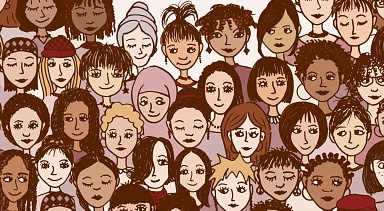This blog post was written by Seher Khawaja from Legal Momentum for our 2018 PowHer The Vote campaign.
There are countless reasons why voting in the upcoming election is so important for women. Among them is the escalation of unrelenting attacks on the physical and economic wellbeing of immigrant women and families in our country.
Here is what we know: immigrant women are often the lowest paid individuals in the United States. Their immigration status, financial insecurity, and lack of access to opportunity drive far too many women into the informal economy, where they work tirelessly for unacceptably low wages. Yet our communities and our economy depend on their essential contributions as domestic workers, farm workers, nurses, home health aides, cashiers, and janitors. The fact that our society undervalues immigrant women in the workplace makes them vulnerable to a host of other abuses, including wage theft, poor working conditions, discrimination, sexual harassment, retaliation, deportation risks, and gender-based violence at home and at work.
Adding insult to injury, current immigration policy seeks to erect additional barriers to prevent immigrant families from legally accessing critical benefits. On September 22nd, the Department of Homeland Security (DHS) announced a proposed rule that would expand upon an existing practice. This proposed rule would allow the government to disqualify an applicant from obtaining a visa or a green card if they legally used public benefits such as Medicaid, food assistance, and housing assistance. The purported purpose of the original rule was to promote “self-sufficiency.” This goal, which was always questionable at best, has not been achieved, since working families earn unfairly low wages. As a result, they often must work multiple jobs and still rely on public benefits to make ends meet. Instead, the proposed rule would amplify problems with the original rule, denying essential benefits to individuals who work, grow our economy, and pay taxes.
Like so many recent immigration measures, the proposed rule, if approved, will have a disproportionate negative impact on women. Immigrant women face high levels of gender-based violence, and women with fewer economic resources are increasingly susceptible to gender-based exploitation. Too many women crossing our border are attempting to escape gender-based violence. Too many women who have made it safely into the United States suffer abuse either at home or in the workplace. Lack of resources and/or stable immigration status renders them all the more susceptible to extreme forms of sexual violence.
By penalizing immigrant women for accessing critical benefits, the proposed DHS rule prevents immigrant survivors of gender-based violence and their families from obtaining services that are vital in assisting them escape and overcome the abuse. Instead, victims, facing the already daunting choice of whether to escape abuse, now face an even higher risk – that escaping will leave themselves and their children homeless, hungry, and without medical care. Even though the rule has yet to be implemented, it has already had a chilling effect. Advocates are reporting that immigrants, victims, and their families are withdrawing or forgoing essential services such as food stamps and children’s health insurance.
The welfare of too many women (and families) hangs in the balance. The persistent undervaluation of work performed by women, combined with disproportionate family obligations, means that women are far more likely to be financially insecure and unable to absorb typical financial irregularities that stem from illness, loss of child care, or even car troubles. To address these problems at their core, our representatives must get behind building the type of comprehensive support systems necessary to eliminate these vulnerabilities and put women on equal footing.
In this upcoming election, so much is at stake for all women, but particularly for the most undervalued women in the United States. The election not only presents an opportunity to correct the ever-present indifference towards sexual violence among many of our leading lawmakers, it presents a moment to reverse the aggressive assault on low-wage and immigrant women and families.
Those we elect to local, state, and federal office in November must be committed to taking necessary measures to end these assaults and to enact necessary safeguards for immigrant women and children.
Here are 5 things that we should be demanding our representatives do:
- Support a living wage. Women and children should no longer be the majority of people living in poverty. All women deserve to earn a wage that allows them to work and support themselves and their families. To move low-wage women out of poverty, we must abolish the subminimum wage and enact one fair wage for all.
- Fight for comprehensive benefits that allow ALL women to work and care for their families. Women should no longer be expected to take on family care responsibilities and then penalized for it. Reversing this discriminatory practice means women must have access to paid family leave; paid sick time; and accommodations for pregnancy, breastfeeding, childbirth, and child care. No woman should be pushed into poverty because she gets sick or must care for a family member or a child.
- Fund comprehensive support services and abolish discriminatory barriers to access. DHS’s antiquated “public charge” rule must be abolished instead of expanded. As women continue to be undervalued and fight for a living wage, they must have unfettered access to essential benefits that cover the cost of living, including cash assistance and assistance to cover food, shelter, and medical care.
- Safeguard survivors of gender-based violence by enhancing their financial security. Escaping abuse requires financial security. All survivors of gender-based violence in our country must have meaningful access to comprehensive support services and workplace accommodations to help them escape and address the abuse.
- VALUE WOMEN. Endorse the Working Women’s Bill of Rights.


